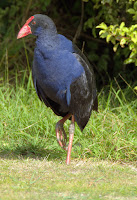Tough. Voracious. Cunning. A little shy of company. I like them. A lot, actually. But apparently, so do stoats and ferrets and possums and feral cats and rats and all those other creatures we thought at the time would make excellent additions to our fauna. Not that the predators would take on a full grown pukeko, but they eat the eggs and the chicks when they can find them. And pukeko chick and roads are not a congenial mix. So these big ungainly birds with their brightly coloured bills and irridescent blue feathers, though there's plenty of them elsewhere in the country, had been absent from the Abel Tasman National Park for years. But lately, a concerted effort at trapping and poisoning predators has allowed them to return. Good on yer, DOC.
I think its their toughness and self sufficiency I admire. They originally found their way here, all by themselves from Australia - they are a sub species of the swamp hens found throughout the South Pacific. They gauge perfectly, how close they will let me come when they are busy stealing from the unattended pots of some German backpackers.
Don't worry little brother. I know I look scary but I would never hurt you. Go ahead, eat your fill. I believe the Sauerbraten is excellent.
Photo: Nikon D7100; Tamron 150-600 @350mm; 1/60, f11, iso400. Great weighty lens was on a monopod. Some post processing in Adobe Lightroom and (later) Corel PSP. As happens with most bird pictures I've cropped this, removing maybe half the frame.




Comments